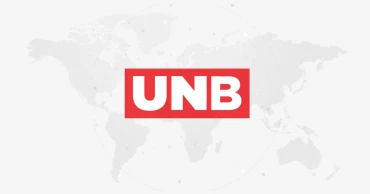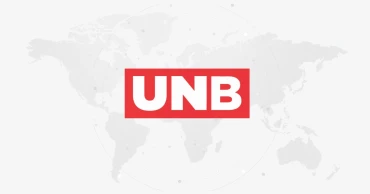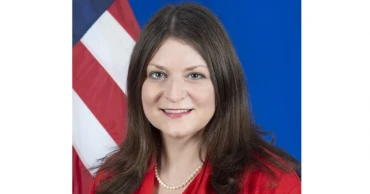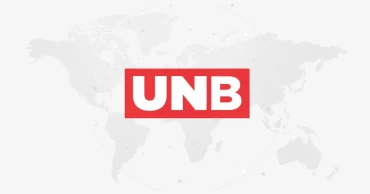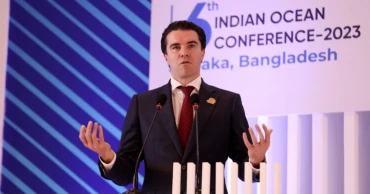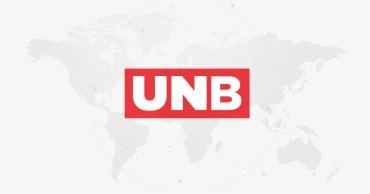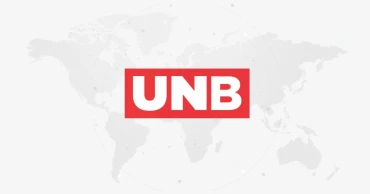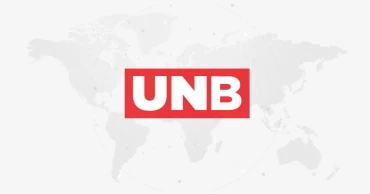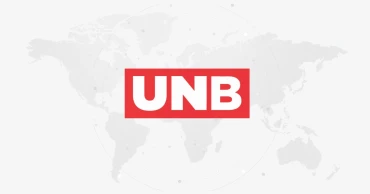Indo-Pacific
Bangladesh a key partner in Bay of Bengal, wider Indo-Pacific: EU
The European Union (EU) has said Bangladesh is a ‘key partner’ for the European Union in the Bay of Bengal and wider Indo-Pacific.
The Council of the European Union (EU) underlined that the EU and the Indo-Pacific face increasingly complex security challenges.
The Council of the EU considers that the EU should continue and further intensify its strategic focus, presence, visibility and actions in the Indo-Pacific with the aim of contributing to their joint stability, security, prosperity and sustainable development, underpinned by the promotion of democracy, the rule of law, human rights and international law.
The EU will reinforce its role as a reliable actor bringing added value to long-standing relations with all partners in the region.
This is especially relevant as the EU has a geographic presence in the Indo-Pacific through its outermost regions and overseas countries and territories.
The Council underlined its commitment to a closely coordinated political presence of the EU and Member States in the region.
Bangladesh delegation visits Algeria to strengthen cooperation
Building on three successful EU-Indo Pacific Ministerial Fora (Paris 2022, Stockholm 2023 and Brussels 2024), the Council said it looks forward to the Fourth EU-Indo Pacific Ministerial Forum, to be convened by the High Representative in Brussels on November 20-21 November, a senior official told UNB.
Those EU-Indo Pacific Ministerial Fora constitute a unique platform for strategically interacting with audiences in both regions.
They reflect the strong and shared interest of the EU and the Indo-Pacific partners in fostering concrete cooperation, including on a region-to-region basis, enhancing mutual security, prosperity and resilience and laying the foundations for an ever-more ambitious partnership.
The EU Embassy in Dhaka has shared their latest policy document – newly issued by 27 Member states at the EU Foreign Affairs Council – which underlines how the European Union and Indo-Pacific are inter-linked and working in partnership on green and digital transition, trade and economic security, and security and defence.
Bangladesh on track for ‘peaceful, inclusive’ polls: Prof Yunus tells IRI
On October 20, the Council of the EU approved conclusions on the implementation of the EU Strategy for Cooperation in the Indo-Pacific stressing that the EU should further intensify its strategic focus, presence, visibility and actions in the Indo-Pacific with the aim of contributing to our joint stability, security, prosperity and sustainable development, underpinned by the promotion of democracy, rule of law, human rights and international law.
The EU Strategy for Cooperation in the Indo-Pacific, which was launched in September 2021, continues to provide a sound framework for EU engagement in a region spanning from the east coast of Africa to the Pacific islands.
Important steps have been taken to implement the strategy in the seven key priority areas, both at the EU and member state level, with a particular focus on three core areas of engagement: security and defence challenges, the green and digital transition, and trade and economic security.
The Council also reiterated its serious concerns about the current situation in both Afghanistan and Myanmar, and its unwavering commitment to achieving a just, comprehensive and lasting peace in the Middle East on the basis of the two-State solution.
EU-Indo Pacific Ministerial Fora constitutes a unique platform for strategically interacting with audiences in both regions, according to the EU.
They reflect the strong and shared interest of the EU and the Indo-Pacific partners in fostering concrete cooperation, including on a region-to-region basis, enhancing mutual security, prosperity and resilience and laying the foundations for an ever more ambitious partnership.
3 months ago
Committed to supporting Bangladesh's economic goals, Biden writes to PM Hasina
US President Joe Biden has written to Prime Minister Sheikh Hasina expressing his willingness to work together to achieve Bangladesh's economic goals.
He also expressed willingness to partnering with Bangladesh on their shared vision for a free and open Indo-Pacific.
"The United States is committed to supporting Bangladesh's ambitious economic goals and partnering with Bangladesh on our shared vision for a free and open Indo-Pacific," President Biden said in his letter seen by UNB.
Entire world willing to work with Bangladesh as PM Hasina placed it in dignified position: FM Hasan
As the two countries embark on the next chapter of the U.S.-Bangladesh partnership, the US President said he wants to convey the sincere desire of his Administration to continue their work together on regional and global security, economic development, climate change and energy, global health, humanitarian support, especially for Rohingya refugees, and more.
"We have a long and successful history of working together to solve problems, and our strong people-to-people ties are the foundation of this relationship," the US President wrote to PM Sheikh Hasina.
Hungary, Kyrgyzstan greet PM Sheikh Hasina on her re-election
The Embassy of the United States of America shared the letter with the Ministry of Foreign Affairs recently.
2 years ago
‘PCA can be something broad to discuss Bangladesh-EU relations’
The new Partnership and Cooperation Agreement (PCA) with the European Union (EU) can be “something very broad” to discuss future Bangladesh-EU relations, said a senior official at the EU headquarters ahead of the 3rd EU Indo-Pacific Ministerial Forum.
Talking to UNB virtually, he mentioned joint launching of negotiations on a new Partnership and Cooperation Agreement (PCA) by Prime Minister Sheikh Hasina and European Commission President Ursula von der Leyen on October 25 last year in Brussels to expand and develop the multi-dimensional relationship between Bangladesh and the EU.
PCA is a legally binding agreement and it is one of three special types of international agreements.
By means of a PCA, the EU works to support the democratic and economic development of a country.
EU eyes a "step change" in relations with Bangladesh in next 5 years: Charles Whiteley
A PCA is typically entered into for ten years, after which they are automatically extended each year provided no objections are raised.
The third EU Indo-Pacific Ministerial Forum will be held in Brussels on February 2 and it will be chaired by the High Representative of the EU for Foreign Affairs and Security Policy and Vice President of the European Commission, Josep Borrell.
Foreign Minister Dr Hasan Mahmud is scheduled to attend the forum who is also likely to have a number of meetings on the sidelines of the forum.
It will include an opening plenary session, three roundtable discussions and a closing session.
The Brussels Indo-Pacific Ministerial Forum builds on the success of the previous two EU Indo-Pacific Ministerial Forums held in Paris in February 2022 and in Stockholm in May 2023.
It will provide a platform for dialogue, for shaping a collective vision for the region’s future and for identifying practical ways to enhance cooperation and deepen solidarity.
Europe and the Indo-Pacific are highly interconnected and interdependent, that is why the EU Indo-Pacific Ministerial Forum serves as a crucial platform for fostering dialogue and cooperation between Europe and the Indo-Pacific.
Asked whether the EU’s strategy for cooperation with the Indo-Pacific countries will concentrate on the security or economic dimensions, the EU senior official referred to the seven pillars of EU’s Indo-Pacific strategy.
The seven priority areas for the EU action are sustainable and inclusive prosperity; green transition; ocean governance; digital governance and partnerships; connectivity; security and defence; and human security.
He said Bangladesh is a massive country in terms of population and it has a very impressive economic growth.
Commending the EU as Bangladesh’s largest export market, Foreign Minister Hasan Mahmud recently requested for EU’s Everything But Arms (EBA) trade concessions until 2032 to support Bangladesh’s smooth graduation from the LDC status as well as EU’s import of diversified products from Bangladesh including jute and jute goods along with traditional products like apparels and shrimps.
The Indo-Pacific region is of key strategic importance, both in economic and geopolitical terms. The 2021 EU Strategy for Cooperation in the Indo-Pacific sets out how the EU is stepping up collaboration with Indo-Pacific partners to contribute to the region’s stability, security and prosperity.
The EU Indo-Pacific Ministerial Forum will bring together the EU and its Member States with countries from the East coast of Africa in the West to the Pacific islands in the East.
The EU and Indo-Pacific partners will discuss how to address the increasing number of complex economic, environmental, geopolitical, and security challenges that affect both regions. Climate change and environmental degradation are existential threats for all.
It is clear that close cooperation is key to addressing these challenges effectively, achieving sustainable economic growth, and strengthening resilience to shocks and disruptions.
The digital economy, in particular, holds the potential for significant innovation and growth.
EU-ASEAN Ministerial Meeting
The 24th EU-ASEAN Ministerial meeting also takes place in Brussels on February 2.
The meeting will be co-chaired by EU High Representative Josep Borrell and the Philippines’ Secretary of Foreign Affairs Enrique Manalo.
It will review the implementation of decisions adopted at the EU-ASEAN Commemorative Summit held one year ago in December 2022 and agree on future steps in developing the EU-ASEAN Strategic Partnership.
During last year's EU-ASEAN Commemorative Summit, the EU pledged to mobilize EUR 10 billion for connectivity projects in ASEAN under the Global Gateway initiative.
To emphasise the centrality of ASEAN in the EU Indo-Pacific Strategy, ASEAN Foreign Ministers have also been invited to participate in the EU’s 3rd Indo-Pacific Ministerial Forum, to be held on the same day.
EU allocates €300,000 in humanitarian aid to gutted Cox’s Bazar Rohingya camps
2 years ago
US Deputy Assistant Secretary Mira Resnick in Dhaka
Bangladesh and the United States will hold the ninth annual bilateral security dialogue in Dhaka on September 5 as part of the "comprehensive security relationship" between the two governments.
The US delegation will be led by Bureau of Political-Military Affairs Deputy Assistant Secretary Mira Resnick. She arrived in Dhaka on Monday (September 4, 2023).
The security dialogue is an annual, civilian-led discussion that touches on all elements of the security relationship between the two countries.
Representatives from both sides will discuss Indo-Pacific regional issues, security and human rights, military cooperation, peacekeeping, security assistance, and counterterrorism, among other topics, said the US Embassy in Dhaka in a media note on Sunday.
Read: Malaysian envoy hails Showcase Malaysia in strengthening trade relations
The United States and Bangladesh have a strong security partnership and share many interests in the Indo-Pacific region, said the embassy.
Both countries share a vision to ensure the Indo-Pacific region is free, open, peaceful, and secure.
"We have a variety of dialogues throughout the year in pursuit of these mutual objectives," the media note reads.
This year, the security dialogue closely follows the bilateral defense dialogue, which took place August 23 and 24 in Dhaka.
The bilateral defense dialogue featured senior officers and civilians from the US and Bangladeshi militaries.
They discussed a range of issues specific to the military-to-military relationship, including military education, peacekeeping and upcoming military exercises, including next year’s Disaster Response Exercise & Exchange.
Read: Dhaka keen to avail regional opportunities for security, connectivity
Resnick oversees the Bureau’s Office of Regional Security and Arms Transfers, which manages over $40 billion annually in government-to-government defense equipment transfers through Foreign Military Sales, Third Party Transfers, and Excess Defense Articles.
Resnick is also responsible for the Bureau’s Office of Security Assistance, which manages approximately $6.5 billion in US security sector assistance annually; coordinates State Department oversight, planning, and input for over $9 billion in the Defense Department security sector assistance programs; and provides State Department input for Department of Defense planning and military activities.
The security dialogue covers a wide range of issues related to partnership between the two countries including strategic priorities and regional security issues, defense cooperation, civilian security cooperation, UN peacekeeping, counter-terrorism, and countering violent extremism.
Bangladesh is likely to reiterate its call to return Rashed Chowdhury, a convicted killer of Father of the Nation Bangabandhu Sheikh Mujibur Rahman, to Bangladesh to face justice. The Rohingya issue may also come up for discussion as a threat in the regional and global contexts.
Read: Sweden, UNDP continue to work on climate adaptation in Bangladesh
At the 8th Security Dialogue held between the two countries at US Department of State in April last year, the two sides had “constructive discussions” on defence agreements like GSOMIA and ACSA as the US is keen to enhance security cooperation with Bangladesh.
General Security of Military Information Agreement (GSOMIA) and Acquisition and Cross Servicing Agreement (ACSA) are “essential” to enable a closer defense relationship, expand opportunities for defense trade, information sharing, and military-to-military cooperation between the United States and Bangladesh.
These issues are likely to come up for discussion as follow up, a diplomatic source told UNB.
2 years ago
Bangladesh, Sweden exchange views on Rohingya crisis, Indo-Pacific, climate change
State Minister for Foreign Affairs Md. Shahriar Alam has exchanged views on different bilateral, regional and international issues of mutual interests and concerns with the cross-party Parliamentary Committee on Foreign Affairs of the Swedish Parliament Riksdag in Stockholm.
The two sides, on June 16, also exchanged views on Swedish development cooperation support to Bangladesh, bilateral trade and investment cooperation, and Bangladesh’s National Action Plan on the labour sector.
Also Read: Sweden keen to collaborate in IT development, green transition
They also discussed possible cooperation between the two countries in IT and fintech sectors and green transition, Bangladesh-EU 50 years of partnership, Rohingya crisis, climate change, war in Ukraine, and Indo-Pacific, according to the Ministry of Foreign Affairs.
The State Minister briefed the Swedish Parliamentary Committee on the socio-economic development of Bangladesh, particularly over the last 14 years, under the visionary leadership of Prime Minister Sheikh Hasina and her ‘Vision 2041’.
Also Read: Dhaka seeks ASEAN’s active role for repatriation of Rohingyas
Committee Chairman Aron Emilsson (Sweden Democrats), Deputy Chairman Morgan Johansson (Swedish Social Democratic Party), and members Margareta Cederfelt (Moderate Party), Jacob Risberg (Green Party) and Magnus Berntsson (Christian Democrats) from the Foreign Affairs Committee of the Riksdag joined the views exchange meeting while the State Minister was accompanied by Bangladesh Ambassador to Sweden, Mehdi Hasan, and Director General (West Europe & EU) of MOFA Kazi Russel Pervez.
Also Read: WTO chief meets PM Hasina, wants Dhaka to reduce subsidies on fisheries
2 years ago
Australia wants an Indo-Pacific region where 'no country dominates, and no countries are dominated'
Welcoming Bangladesh’s Indo-Pacific Outlook, Australia has said it seeks a region where “no country dominates, and no countries are dominated,” and the country thinks building a region like that requires efforts by all countries in the region.
“We welcome the Bangladesh government’s Indo-Pacific Outlook in that context. I particularly welcome the point in the Indo-Pacific Outlook that argues for an inclusive region,” Australian Assistant Foreign Minister Tim Watts said while responding to a question from UNB in a group session.
He laid emphasis on a “strategic equilibrium” where each country is able to make its own choices about its future -- “free from coercion”, and where sovereignty is respected. Bangladesh’s Indo-Pacific Outlook echoes many of Australia's shared principles for the region, he said.
Watts said Australia's vision for the Indo-Pacific and the Indian Ocean region is “peaceful, prosperous, and resilient” -- a region that is governed by rules, norms and international law.
“I think that reflects the Australian government's desire for a region where the interests of small nations are respected, and where all countries can make decisions for themselves, and where their sovereignty is respected,” he said.
Also Read: A seamless transition into an Indo-Pacific is to our collective advantage: Jaishankar
2 years ago
Want security in the region but no defence pact: Momen on Indo-Pacific Strategy
Foreign Minister Dr AK Abdul Momen has said the goals set out for the Indo-Pacific region are not much different from Bangladesh’s, but the only concern is about its defence aspect, if any.
“Only thing we are afraid of — if it is designed for a defence pact, because we are a peace-loving country. We don’t have any intention (to fight against anyone). We would like to see development in the whole region. We want security (in the region) but no defence pact,” he said.
Momen made the remarks while responding to a question during a conversation on economic diplomacy with a focus on growth and development.
The Onero Institute partnered with the Atlantic Council’s South Asia Center for the session held at the Elliott School of International Affairs, George Washington University this week.
Read more: US urged to create “safe protection zone” in Myanmar to facilitate Rohingya repatriation
The dialogue was moderated by the senior director of the Atlantic Council’s South Asia Center, Irfan Nooruddin.
The foreign minister said Bangladesh does not have any disagreements on the issue and it also wants open, free, secure and freely navigable Indo-Pacific under the international laws.
He said Bangladesh wants economic development in the whole Indo-Pacific region and finds many things in common with the goals set up. “We don’t have much difference. We believe the next century is for Asia and the Indo-Pacific provides an opportunity and potential.”
Responding to a question on India-US-China, Momen said the US and China have their own tensions. “The US is our old friend while we have rock-solid relations with India. China became our development partner as they have money,” he said.
Read more: Digital Security Act not for restricting media freedom, Momen tells US
He said the western countries including the US “do not come up with money but they come up with advice except for some exceptions.”
“We are very prudent in accepting loans from China. We signed agreements on a big amount but we took a very small amount. It can’t influence our policies,” Momen said while responding to another question.
The foreign minister said Bangladesh is a “hub of connectivity” and maintains very good relations with all its neighbours.
“We have resolved all critical issues with India peacefully through dialogue and discussion,” he said.
Read More: Due to BGB initiative, after 4 decades Bangladesh gets back 1 acre of disputed land on Naogaon border
“Though Myanmar is a difficult case, we don’t have any quarrel with them. We have only one difficult problem (Rohingyas),” Momen added.
He highlighted issues related to emerging Bangladesh, its socioeconomic achievements, economic partnership and prospects with the USA, economic and public diplomacy, regional development and navigating relations with major powers.
2 years ago
Australia eyes strengthening defence cooperation with Bangladesh to promote "inclusive" Indo-Pacific region
Australian High Commissioner to Bangladesh Jeremy Bruer has said Australia is looking forward to strengthening their defence cooperation with Bangladesh to promote a "secure, prosperous and inclusive" Indo-Pacific region.
"We have established a defence office in Bangladesh with a resident Defence Adviser to strengthen relationships between the defence forces of our two countries," he said.
This development was followed by Bangladesh’s participation in Indo-Pacific Endeavour, one of Australia’s key regional defence engagements, and Australia’s participation in Bangladesh’s International Fleet Review in 2022.
The High Commissioner said Australian businesses are increasingly interested in Bangladesh as demand rises for their high-quality products and services.
He said Australian businesses see further opportunities to diversify trade and investment with Bangladesh in textiles and apparel, agricultural products such as wool, agribusiness, fisheries, food and beverages, minerals, manufacturing, information and communications technology services, skills development and education services.
Australia is also well-placed to supply energy resources, such as LNG, to help fuel Bangladesh’s growing demand for electricity, said the envoy.
"Our nations also share a love of sport, especially cricket, and many Australians have played with, trained, coached and befriended Bangladeshi players. Our cooperation in arts and culture is also growing, with participation by Australian artists in arts and literary events in Bangladesh, and by Bangladeshis in Australian events," said Bruer.
On 26 January, Australia Day, Australians around the world unite to mark Australia.
It is a chance to acknowledge the past, recognise the present and look optimistically towards the future.
Read more: Australia assessing viability of 2nd spl flight from Dhaka to Melbourne
"Today, we reflect on what it means to be Australian, to celebrate contemporary Australia, to acknowledge our history and connect with other Australians. We reflect on our diverse society, including our landscape, our resilience and innovation, and our bright future," said the High Commissioner in a message.
Australia Day is a day to acknowledge, interrogate and reflect upon their history.
Australia doesn’t date back merely to 1788.
For more than 60,000 years, Australia was cared for by the Aboriginal people, who represent one of the oldest continuing cultures on earth.
Aboriginal and Torres Strait Islander people are the traditional custodians of our lands and waterways.
They occupy a fundamental position in Australia’s story.
For many indigenous Australians, Australia Day represents the complexities and hardship caused by European settlement. We recognise this history, and we respect and honour our first Australians on our national day.
"Today, Australia is an outward-looking country, strongly connected to the rest of the world. It is also the most successful multicultural society in the world, a country built on migration," he said.
People from over 200 countries, including Bangladesh, have chosen to call Australia home.
And, as a multicultural country, Australia has benefited from its belief in diversity, inclusion and tolerance – values we hold dear.
Australia and Bangladesh are old friends, sharing Commonwealth traditions and strong links.
"Australia is proud to have been one of the first countries to recognise the newly independent nation of Bangladesh, in January 1972," said the High Commissioner.
Last year, they celebrated the 50th anniversary of diplomatic relations between the two countries.
"Today, I recall with considerable satisfaction that Australia assisted Bangladesh’s admission to the United Nations in December 1971, and with bipartisan support in our parliament," said the High Commissioner.
In January 1975, the then prime minister, Gough Whitlam, visited Bangladesh and met his Bangladeshi counterpart, Bangabandhu Sheikh Mujibur Rahman, Father of the Nation.
"Our friendship will endure because of its strong and authentic foundation. The only foreigner ever to have received the Bir Protik — one of Bangladesh’s highest awards for bravery — was an Australian citizen, William Ouderland. Ouderland organised and trained the guerrilla fighters of the Mukati Bahini and provided them with food and shelter and medicine."
Links between Australia and Bangladesh, including sporting links, go back a long way before Australia’s support for Bangladesh’s independence.
In 1877, one of the players in the Australian team playing the first Test match in history, Bransby Beauchamp Cooper, was born here in Dhaka, when it was part of British India.
Australia and Bangladesh enjoy close people-to-people links, nurtured over many years of migration, and through sport and education.
About 80,000 people of Bangladeshi origin have settled in Australia, and we have welcomed thousands of Bangladeshi students studying in Australia’s world class institutions.
"Our Australia Awards program, which provides scholarships for Bangladeshi students to undertake master’s degrees in Australia, has produced over 3,000 Bangladeshi alumni," said the High Commissioner.
He said many of them today are occupying important and influential positions, and making great contributions to Bangladesh’s development.
Each year about 200 Bangladeshi nationals receive Australian Government scholarships to study masters degrees and short courses at Australian institutions.
Australia and Bangladesh are both active members of multilateral institutions such as the UN, WTO, the Commonwealth and the Indian Ocean Rim Association (IORA), the only ministerial-level forum in the Indian Ocean.
"Australia continues to support Bangladesh in its role as IORA chair. We remain committed to the aims and purposes of the Universal Declaration of Human Rights and to the promotion and protection of human rights," said the High Commissioner.
Australia is supporting a range of development investments to support Bangladesh’s transition to a middle-income country.
This includes support for inclusive education, skills development, poverty alleviation, social protection and private-sector engagement.
Supporting and providing economic opportunities for the most disadvantaged and marginalised, including women and girls and people with disabilities, is a priority in all our programs.
"Bangladesh has a young population. So investing in an educated and suitably skilled workforce is crucial to maintaining economic growth and recovery from the pandemic," said the High Commissioner.
The long-standing Strategic Partnership Arrangement (SPA) with BRAC means that Australian aid reaches a large number of people throughout Bangladesh.
"We are contributing $85 million from 2021 to 2026 to the third phase of the SPA. Our Social Security Policy Support program is supporting the Bangladesh Government’s reforms to strengthen the social security system," said the Australian envoy.
"Additionally, we support more than 50 national and international NGOs through the Australian NGO Cooperation Program (ANCP), focusing on inclusive development across the country. We’re also supporting viable private sector opportunities through Australia’s Business Partnerships Platform and the forthcoming Emerging Markets Impact Investment Fund."
Australia recognises the impact on communities hosting over 919,000 displaced Rohingya, who rely on humanitarian assistance to survive.
Read more: Pahela Baishakh: US, Australian envoys greet Bangladeshis
Australia will continue to work to find a durable solution and to pursue accountability and justice for the Rohingya as a result of the abuses they have suffered.
In the meantime, the envoy said, they remain committed to helping Bangladesh and humanitarian actors to meet the needs of Rohingya and host community members in Cox’s Bazar.
In 2022-23, Australia will provide AUD135 million (building on AUD480 million provided since 2017) to address humanitarian crises in Myanmar, as well as to support Rohingya refugees and host communities in Bangladesh, providing essential protection, education and health services for those most in need, including women, girls and people with disabilities.
Two-way trade between Australia and Bangladesh has grown substantially over the last decade, reaching AUD3 billion in 2021-22, with balanced imports and exports.
Bangladesh’s exports to Australia are largely ready-made garments, leather accessories, processed food and jute. Bangladesh is Australia’s largest chickpea market.
The Trade and Investment Framework Arrangement (TIFA) signed with Bangladesh on 15 September 2021 was a significant achievement that recognised the strength and depth of the economic relationship.
Under the TIFA, both countries are working together to grow and diversify trade and investment opportunities.
Bruer said are proud of their shared history and of the warm, multifaceted and mutually beneficial relationship that exists between our two countries.
"I look forward to the next 50 years of friendship between Australia and Bangladesh," he said.
3 years ago
Indo-Pacific: France eyes closer cooperation with Bangladesh
France wants to enhance cooperation with Bangladesh and will have “ever closer” cooperation with countries of the Indo-Pacific, “significantly with Bangladesh” to address major challenges in terms of climate change and security, says a visiting senior French official.
“It gives us a golden opportunity to review the common works we pursue together, decide new projects and initiatives across the board,” Bertrand Lortholary, Director for Asian Affairs (General Political Directorate) at the French Ministry of Europe and Foreign Affairs told reporters on Thursday.
France and Bangladesh share the same vision for a “free, open, peaceful, secure and inclusive” Indo-Pacific region, based on international law and with shared prosperity for all.
Responding to a question, Lortholary said there is a lot the two countries can do and military to military cooperation is part of that defence and security cooperation.
“When we talk about security, we also talk about the security of maritime transport, traffic of goods on the oceans, and tackle together illegal fishing. We are also talking about the peacekeeping operations where Bangladesh has a prominent position,” he said.
Read more: France lauds Bangladesh's steady, outstanding development
Earlier, the French official had a political consultation with the Bangladesh side led by Director General (West Europe and EU) Kazi Russel Pervez and discussed issues of mutual interest including economic cooperation , people to people exchanges, connectivity, scientific cooperation and issues related to climate change.
Ambassador of France to Bangladesh Marie Masdupuy, Deputy Head of Mission Guillaume Audren de Kerdrel and Deputy Director, French Development Agency (FDA) Cecilia Cortese were also present at the meeting.
“We are enjoying a thriving relationship. We have a very solid foundation,” said the French official, referring to Prime Minister Sheikh Hasina’s state visit to France in November 2021.
During Hasina’s state visit, the two countries stated their will to further develop the defence and security component of their partnership.
To that end, both countries agreed to strengthen dialogue and continue their cooperation, in particular the area of training, which was launched during the visit.
Read more: France keen to work together with Bangladesh for economic, social benefits
The two countries will be holding the second consultation in Paris next year.
3 years ago
US keen to work with Bangladesh, other partners to ensure an open Indo-Pacific
US Ambassador to Bangladesh Peter Haas on Monday said they seek to work with Bangladesh and other partners to build an Indo-Pacific that is free and open.
"We want a region that is free and open, interconnected, prosperous, secure, and resilient. We share this vision with many other nations," he said, sharing the five elements of the Indo-Pacific that the US shares with many other nations.
The US ambassador was speaking at a panel discussion “Untangling the Myriad of Multilateral Frameworks in the Indo-Pacific” at a programme titled “Bay of Bengal Conversation” held at a hotel in Dhaka.
Read more: US to be bold in promoting its vision of a free, secure, and prosperous world: Haas
He said they do not ask any nation to choose between the United States and any other partner.
"As we manage shifting geopolitical trends, the United States will conduct itself as a reasonable leader. We do not seek conflict. We do not seek a Cold War," Haas said.
The ambassador said the United States will be unabashed in promoting their vision of a free, open, secure, and prosperous world.
The window of opportunity to deal with shared threats is closing fast, said the ambassador.
He said the United States and 13 partner countries launched negotiations for the Indo-Pacific Economic Framework, or IPEF, what he described as a “novel economic arrangement” that reflects their collective desire to address 21st century challenges that go beyond trade and investment.
The membership of IPEF reflects the economic diversity of the region as well as the interconnectivity among partner countries that drives economic growth, job creation, and innovation, he said.
IPEF is intended to be open and inclusive to others who wish to join in the future if they share the goals of IPEF and work to achieve those goals.
“We will continue to work on these issues and grow our economic partnership bilaterally with all nations, including Bangladesh,” said the envoy.
Read more: Excited to see more Bangladeshi students are choosing US: Peter Haas
“Let us work together to strengthen the foundations of peace and prosperity in the Indo-Pacific and around the world,” he added.
The inaugural session was addressed by former President of Serbia Boris Tadic, CGS Chairman Dr Manjur A Chowdhury and CGS Executive Director Zillur Rahman.
3 years ago

